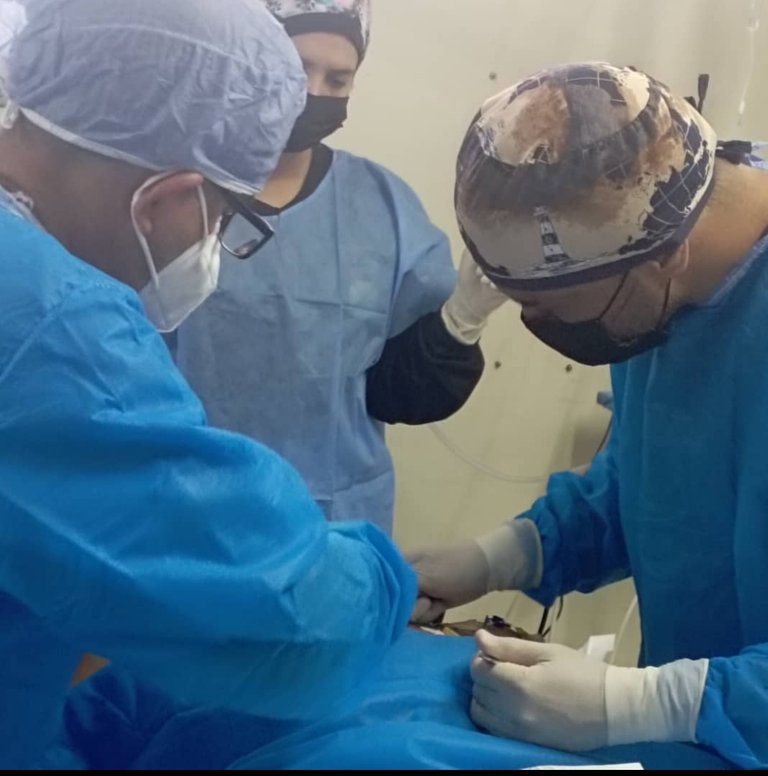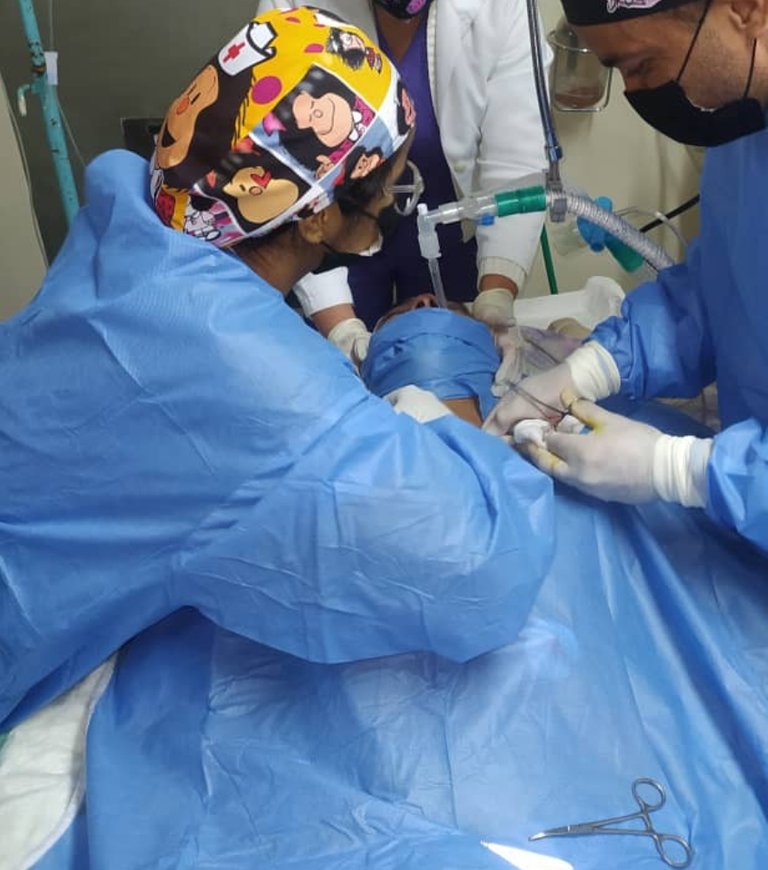ESPAÑOL:

Saludos queridos Hivers, reciban un abrazo grande de mi parte, cargado de buenas energías, energías vibrantes llenas de positivismo, y bendiciones del Altísimo traducidas en salud, prosperidad y amor.
Cuando era niño odiaba ir al médico, pues tenía esa sensación que el doctor podía sacar una inyección en cualquier momento para aliviar la gripe, la tos, el dolor o cualquier padecimiento que tuviese en ese momento.
Debo confesar, que mis visitas a los médicos eran frecuentes pues tenía un padecimiento renal, que llevo a muchos estudios diagnósticos, y diferentes especialistas para determinar la causa.
Estuve en manos de médicos generales, pediatras, nefrológos, entre otros, algunos muy amables y cordiales (mis favoritos), otros muy serios y un poco odiosos que hacían que la consulta fuese algo tensa tanto por el temor inicial, como por lo pesado de la consulta.
Pues bien, fue tanto el transitar por los diferentes centros de salud de todo el país, que mi odio a la medicina se empezó a transformar en curiosidad por aprender del ejercicio médico, y por supuesto conocer que pasaba con mi cuerpo.

Mi perspectiva empezó a cambiar, veía al médico (independientemente de su carácter) como una una herramienta cuyo objetivo principal era el bienestar del paciente (en este caso yo), además la bata blanca paso de generarme miedo a producirme admiración, y fue así como cada visita el médico, se convirtió en un interrogatorio incesante de mi parte por conocer sobre la enfermedad y la medicina.
Debo dar gracias a Dios y a todos mis médicos tratantes de aquel tiempo, pues tuve un diagnóstico oportuno y el tratamiento adecuado para poder sanar, y hoy en día llevar una vida óptima, y fue esa experiencia que tuvo gran repercusión en mi vida para estudiar medicina.
Pero, cómo es natural en nuestra vida y a pesar de estar completamente sano de la enfermedad renal de infancia, no estamos exentos de padecer otro tipo de transtornos en nuestra salud, y claro, cómo cualquier persona, he sufrido, de gripe, amigdalitis, dolor de cabeza, fiebre, problemas estomacales, entre otros, padecimientos que me hizo ir al médico sin temor o traumas muchas más veces a lo largo de mi vida, teniendo exitosas visitas en todos los casos.
Sin embargo, muchas veces cuando me enfermaba tenía la duda, a qué especialista debía acudir cuando una situación afectaba mi salud, si acudía a medicina general o por el contrario me hacía ver con un internista para tener mayor profundidad en cuanto a la enfermedad.

Pospuesto, las dudas anteriores surgen sobretodo luego de empezar la carrera que hoy ejerzo, y a medida que pasaba el tiempo fui descubriendo las diferencias entre el médico general y el médico internista (especialidad que hoy en día estoy estudiando).
Hoy te cuento la diferencia entre ambos:
Y es que muchas personas suelen creer que un médico general puede cumplir exactamente las mismas funciones que un internista, si bien es cierto que ambos pueden realizar procedimientos similares; pero hasta cierto punto.
En este sentido, la medicina general es la práctica de la medicina no especializada en pacientes de todas las edades, mientras que la medicina interna es una especialidad que trabaja principalmente con adultos.
Muchos pacientes de patologías como diabetes, EPOC, hipertensión, colesterol elevado, enfermedades cardíacas, dificultades renales, problemas endocrinos, trastornos de la sangre y enfermedades infecciosas son atendidos generalmente por un internista.
Los médicos internistas y generales diagnostican y tratan pacientes dentro de los confines de su nivel de preparación, por lo cual les dejo en este post algunos procedimientos que pueden realizar ambos.
El médico general puede:
-Preescribir medicamentos.
-Reparse heridas y laceraciones.
-Remover cuerpos extraños de piel o ojos.
-Promover educación integral de salud general.
-Actuar cómo médico de atención primaria.
-Manejo integral de salud e inmunización.
-Proveer el manejo de pacientes con enfermedades agudas y crónicas, tanto niños como adultos.
-Remitir con su referencia a servios especializado si es requerido.
-Otorgar reposo de hasta 72 horas.
Por otro lado el Médico internista está capacitado para:
-Exicisiones en la piel.
-Administración para bloqueadores de nervios.
-Intubación de pacientes.
-Manejo de enfermedades crónicas y complicaciones en el Adulto
-Inyecciones a puntos articulares.
-Manejos de pacientes críticos en edad adulta.
-Apoyo Geriatra.
-Pruebas y manejo de pacientes Ginecológicas menores.
-Emergencias hospitalarias severas (infartos, cetoacidosis diabética, tromboembolismo pulmonar, accidentes cerebrovasculares).
-otorgan reposo de hasta 21 días.

Debo destacar que ambos médicos son de gran importancia para la sociedad; pero es necesario conocer a quien podemos acudir dependiendo de la situación. 🏥
Gracias.
Dios siempre de Cabrestero.
PD: Fotos de mi propiedad.
ENGLISH:
Greetings dear Hivers, receive a big hug from me, full of good energies, vibrant energies full of positivism, and blessings from the Most High translated into health, prosperity and love.
When I was a child I hated going to the doctor, because I had that feeling that the doctor could give me an injection at any time to relieve the flu, cough, pain or whatever ailment I had at that moment.
I must confess that my visits to the doctors were frequent because I had a kidney ailment, which led to many diagnostic studies and different specialists to determine the cause.
I was in the hands of general practitioners, pediatricians, nephrologists, among others, some very kind and cordial (my favorite), others very serious and a little hateful that made the consultation a little tense both for the initial fear, as well as for the heavy consultation.
Well, it was so much the transit through the different health centers around the country, that my hatred of medicine began to transform into curiosity to learn about the medical practice, and of course to know what was happening with my body.
My perspective began to change, I saw the doctor (regardless of his character) as a tool whose main objective was the welfare of the patient (in this case me), also the white coat went from generating fear to produce admiration, and that was how each visit to the doctor, became an incessant questioning on my part to learn about the disease and medicine.
I must thank God and all my treating physicians of that time, because I had a timely diagnosis and the appropriate treatment to be able to heal, and today lead an optimal life, and it was that experience that had a great impact on my life to study medicine.
But, as it is natural in our life and despite being completely healthy from childhood kidney disease, we are not exempt from suffering from other types of disorders in our health, and of course, like any person, I have suffered from flu, tonsillitis, headache, fever, stomach problems, among others, ailments that made me go to the doctor without fear or trauma many more times throughout my life, having successful visits in all cases.
However, many times when I got sick I had the doubt, which specialist should I go to when a situation affected my health, if I went to general medicine or on the contrary I had to see an internist to have more depth regarding the disease.
Postponed, the previous doubts arose especially after starting the career that today I practice, and as time went by I discovered the differences between the general practitioner and the internist (specialty that today I am studying).
Today I will tell you the difference between the two:
And is that many people often believe that a general practitioner can perform exactly the same functions as an internist, although it is true that both can perform similar procedures; but to a certain extent.
In this sense, general medicine is the practice of non-specialized medicine in patients of all ages, while internal medicine is a specialty that works primarily with adults.
Many patients with pathologies such as diabetes, COPD, hypertension, high cholesterol, heart disease, kidney difficulties, endocrine problems, blood disorders and infectious diseases are usually seen by an internist.
Internists and general practitioners diagnose and treat patients within the confines of their level of preparation, so I leave you with some procedures that can be performed by both in this post.
The general practitioner can:
-Prescribe medications.
-Repair wounds and lacerations.
-Remove foreign bodies from skin or eyes.
-Promote comprehensive general health education.
-Act as a primary care physician.
-Comprehensive health and immunization management.
-Provide management of patients with acute and chronic illnesses, both children and adults.
-Refer with referral to specialized services if required.
-Grant rest for up to 72 hours.
On the other hand, the internist is trained to:
-Skin excisions.
-Administration of nerve blockers.
-Patient intubation.
-Management of chronic diseases and complications in the adult.
-Injections to articular points.
-Management of critical adult patients.
-Geriatric support.
-Testing and management of minor Gynecological patients.
-Severe hospital emergencies (heart attacks, diabetic ketoacidosis, pulmonary thromboembolism, stroke).
-They provide rest for up to 21 days.
I must emphasize that both doctors are of great importance to society; but it is necessary to know who we can turn to depending on the situation. 🏥
Thank you.
God always of Cabrestero.
PS: Photos of my property.
Muy buena explicación 👩🏽⚕️🧑🏻⚕️ saludos !
Your content has been voted as a part of Encouragement program. Keep up the good work!
Use Ecency daily to boost your growth on platform!
Support Ecency
Vote for new Proposal
Delegate HP and earn more
Una excelente información y explicación de un tema muy importante 🤗
Su post ha sido valorado por @ramonycajal
Dear @arturocajoti86,
May I ask you to review and support the Dev Marketing Proposal (https://peakd.com/me/proposals/232) we presented on Conference Day 1 at HiveFest?
The campaign aims to onboard new application developers to grow our ecosystem. If you missed the presentation, you can watch it on YouTube.
You cast your vote for the proposal on Peakd, Ecency,
Thank you!